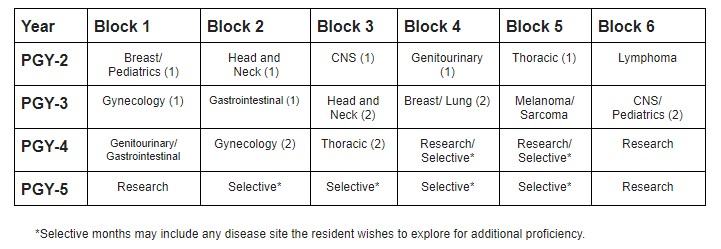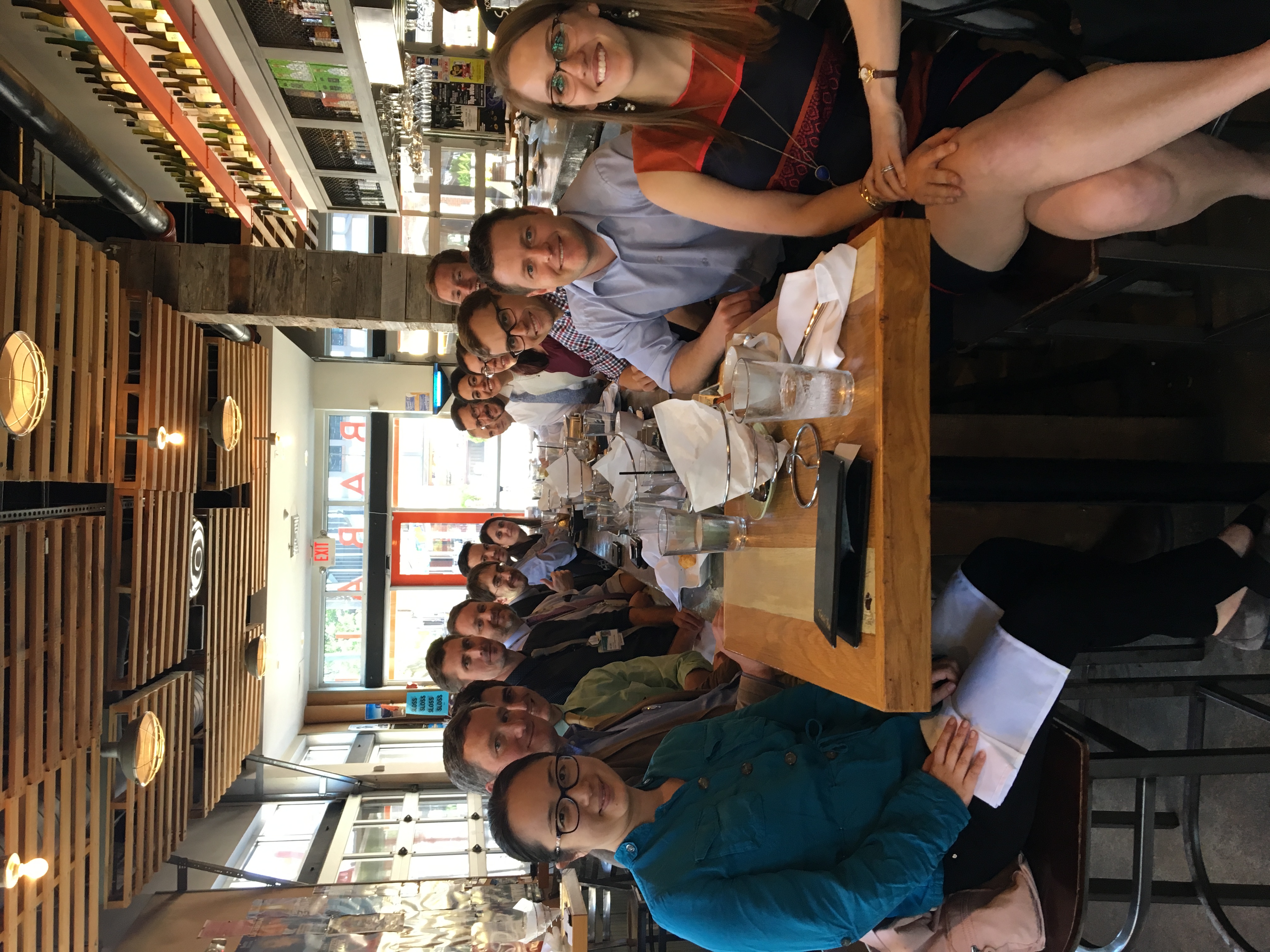The UAB Department of Radiation Oncology’s Residency Program is proud to offer a comprehensive residency program that produces experts in clinical radiation oncology, radiation physics, and radiobiology. Our graduates regularly rank in the top quartile on board examinations, and our program is recognized to be among the nation’s best.
The UAB Department of Radiation Oncology’s Resident Education Program is accredited through the ACGME. Residents’ training incorporates rotations with experts in all ACGME radiation oncology subsites, regular didactic lectures, and departmental conferences. In addition, residents participate in multidisciplinary clinics and tumor boards interacting with medical and surgical oncology colleagues, pathologists, radiologists, and geneticists to emphasize a holistic approach to the management of cancer.
Orientation
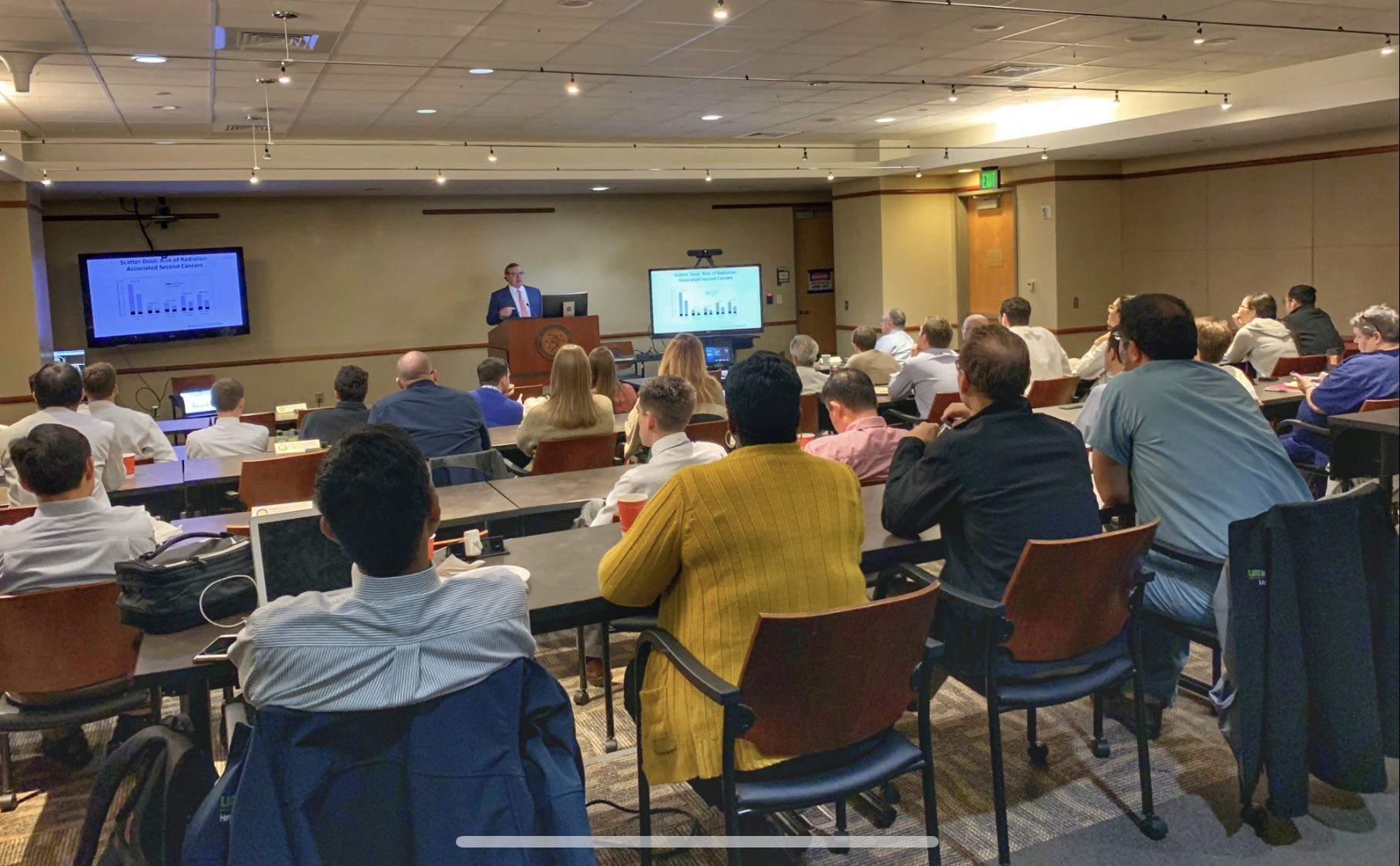
Residents are welcomed to Orientation the first week in July, and participate in the national standardized Introductory Radiation Oncology Curriculum (IROC) to learn essential radiation oncology concepts and skills. In addition, residents receive an introduction to the daily routines of the department and learn essential “hands-on” skills like contouring and beam placement. Following the completion of orientation, incoming residents are mentored by the chief residents and assisted by senior residents during their first clinical rotations.
Clinical Education
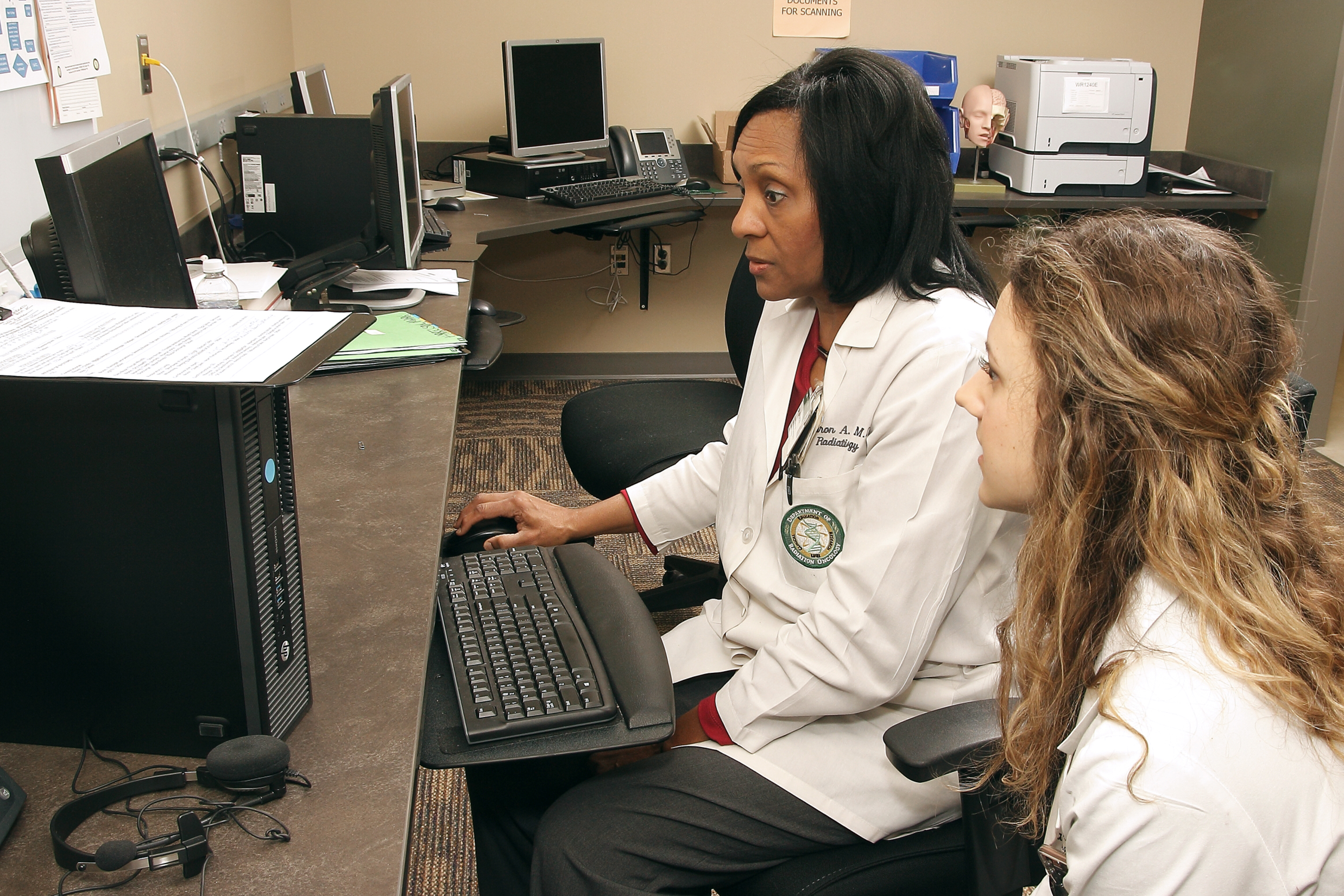
Residents work on-on-one with our attending physicians, spending at least 36 months in clinical rotations. Our department faculty specialize in treatment of particular organ sites, such that each rotation focuses on a select number of organ/disease sites. All faculty offer palliative treatment and staff inpatient consultations, allowing residents to learn management of palliative care and radiation oncology emergencies.
UAB serves a diverse patient population, including the urban, suburban, and rural communities around Birmingham and throughout the state. We are honored to treat many veterans from the VA hospital, and many patients referred from the Southeast for our expertise. With this large catchment area, our residents see a wide variety of common and rare cancers throughout their four year training.
Residents most frequently meet patients in our outpatient clinics for initial consultation and routine follow-up visits. If radiation therapy is recommended, residents assist with simulation, treatment planning, and undertreatment patient visits for their assigned patients. Residents also participate in chart rounds and other patient safety conferences to learn the importance of quality assurance programs to ensure safe treatment delivery.
During each rotation, residents present cases and participate in specialty tumor boards and conferences relating to the disease sub-site(s) of the attending physician. Multidisciplinary interaction with medical oncology, pathology, diagnostic radiology, and surgical oncology satisfies all ACGME requirements for graduation. Site-specific conferences include: gynecologic, head and neck, pediatric, neuro-oncology, breast, thoracic, hepatobiliary, lymphoma, genitourinary and molecular oncology conferences.
Didactic Curriculum
Residents’ education is a top priority for our department, as evidenced by our robust didactic curriculum. Weekly didactics are grouped by disease site, and include presentations by department faculty, local experts, residents and visiting professors. Didactics include site-specific anatomy and contouring, radiographic anatomy, surgical principles, review of high-yield publications, and dosimetry and treatment planning concepts. At the end of each didactic block, we host a socratic session to review key topics.
The department hosts a monthly journal club, correlating with the disease site discussed in our didactic lectures. Residents also take the lead in presenting cases during our morbidity and mortality rounds.
Each spring, the department invites all program graduates preparing for oral boards and senior level residents to participate in our Annual Mock Oral Examination. The disease-site specific faculty lead participants through a series of cases and provide feedback to help prepare for the ABR Certification (Oral) Exam.
Resident Research
The UAB Department of Radiation Oncology maintains a robust presence in cancer research. Our residents are strongly encouraged to participate in research projects tailored to their specific interests. The collaborative university atmosphere and diverse patient population at UAB provide residents with a wealth of resources to ask, investigate, and publish their innovative research ideas.
Learn more about research at UAB in the Department of Radiation Oncology.
Physics & Radiation Biology

Residents participate in physics and radiation biology instruction taught by seasoned instructors, offered on an annual basis. The aim of the physics and radiation biology programs is not simply to prepare residents for board examinations but also to teach them basic concepts applicable to radiation therapy treatments. Our residents regularly score above the 90th percentile on the annual in-service exam and in the top quartile on the ABR Initial Qualifying board exams. In fact, current and former residents have achieved the nation’s highest score in the physics and clinical sections of the in-service exam. Our program is considered by many to be among the very best in the nation.
Physics
The Physics teaching program begins during orientation, when new residents are made familiar with radiation therapy machines, immobilization devices and radioisotopes. Our weekly physics lectures follow the ASTRO Core Physics Curriculum for Radiation Oncology Residents, consisting of basic and clinical radiotherapy physics including external beam and brachytherapy. The curriculum is repeated on an annual basis and offered to all residents.
Radiation Biology
The Radiation Biology teaching program is led by Dr. Lewis Shi, who brings specific expertise in cancer biology and immunology. Radiation biology instruction begins during orientation, when new residents learn about the concepts of BED, fractionation, and the 4 “R’s” of radiobiology. Lectures then cover high-yield radiation and cancer biology concepts to prepare residents for the annual inservice exam and board exam. Some select topics include: DNA damage and repair, mechanisms of cell death, hypoxia and angiogenesis, tumor microenvironment and immunotherapy. The curriculum is repeated on an annual basis and offered to all residents.
SRS & SBRT
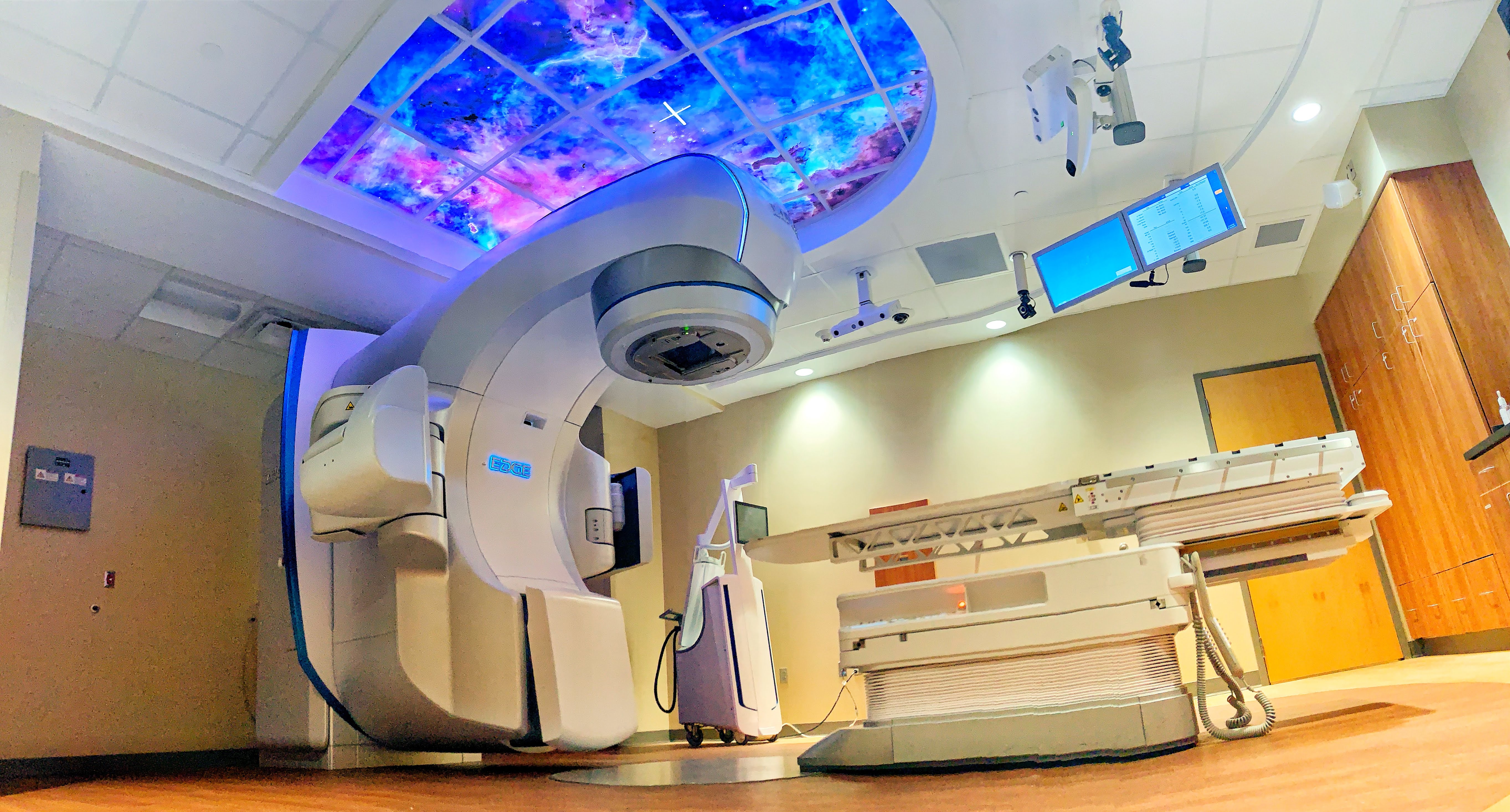
The UAB Department of Radiation Oncology has a long history of excellence in radiosurgery, treating over 1500 SRS/SBRT cases annually. As the first institution in the U.S. to use Varian Edge Virtual Cone, HyperArc™, and RapidArc™ technologies, residents are exposed to state of the art technology for these precision procedures. Residents actively participate in radiosurgery planning and treatment delivery procedures, and present cases for discussion weekly at our specialized Multidisciplinary Radiosurgery Conference.
Of note, UAB’s Department of Radiation Oncology has partnered with Varian to develop a three-day conference that discusses and demonstrates stereotactic radiation (SRS) and stereotactic body radiation (SBRT) delivery with Eclipse™ and TrueBeam™. Learn more about the SRS/SBRT Training Course.
Procedures
UAB has a large brachytherapy program, owing to the wide catchment area of the hospital system. Residents receive didactic lectures and hands-on demonstrations in brachytherapy techniques and treatment, including intracavitary and interstitial high dose rate (HDR) treatment. While on the brachytherapy service, residents directly participate in all brachytherapy procedures, including applicator placement, treatment planning, and treatment.
Electives
The O'Neal Comprehensive Cancer Center at UAB provides the environment and experience for all ACGME requirements to be satisfied without external or off-site rotations. However, residents with particular interests may wish to design individualized electives or enrichment activities with the permission of the program director.
Prior residents’ enrichment activities have included: pursuit of an Masters in Public Health, LDR prostate brachytherapy elective, and a particle therapy international elective to the Heidelberg Ion Therapy Center (HIT) in Heidelberg, Germany.
Benefits
The UAB Department of Radiation Oncology is proud to offer residents a competitive benefits package.
-
- Competitive Resident Salary
- Shared-Cost Health and Dental Insurance
- Three weeks paid vacation per academic year
- Parental leave
- Sick Leave
- Travel expenses paid for educational trips where the resident presents their research
- A one-time educational fund stipend
- Additional funding opportunities through publication and teaching
- Discounted UAB Campus Recreation Center Membership
- At No Cost to Residents:
-
-
- Professional Liability Insurance
- Group Term Life Insurance
- Long-Term Disability Insurance
- Accidental Death and Dismemberment Insurance
- Parking
- Discount in UAB hospital cafeteria
- Medical Library and Journal Access
- Remote EMR and Treatment Planning Access
-
-
Learn more about Residency at UAB.
Learn more about UAB employee benefits.
For all other questions, please contact Tracey Cotton-Bickham at tcotton@uabmc.edu or (205) 975-0222.
Resident Retreat
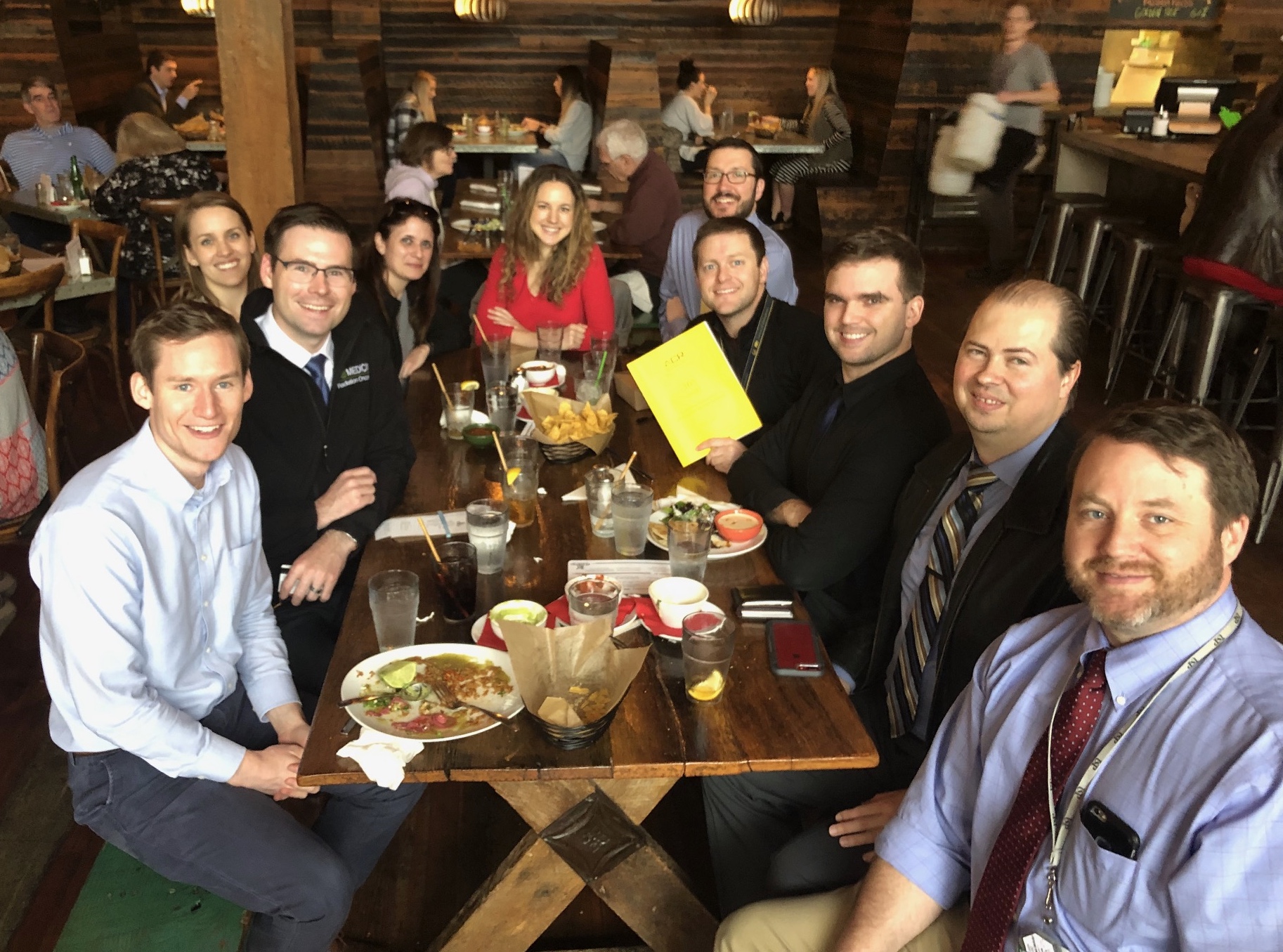
Each fall our residents participate in a one-day residency retreat, which combines leadership training, wellness and professionalism education, and team building. Residents enjoy time away from the clinic to set personal and career goals, and get to know one another. Our collegial and collaborative environment is one of the primary reasons many residents enjoy training at UAB.
Learn more about why our residents chose to train at UAB.
Sample Rotation Schedule
Residents are assigned to approximately eight-week rotations working on-on-one with our attending physicians, spending at least 36 months in clinical rotations. Research/elective may be scheduled consecutively or nonconsecutively, based on resident interest and preference. Below is a sample rotation schedule.
Sample Schedule:
